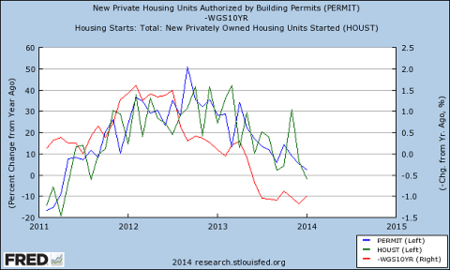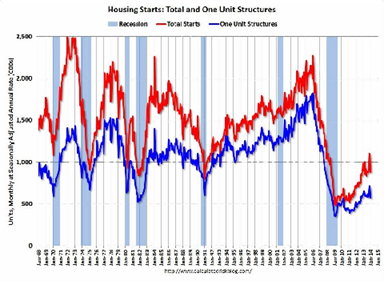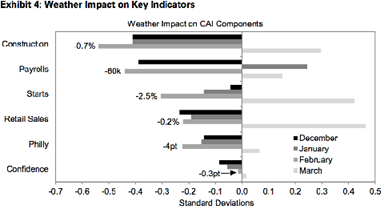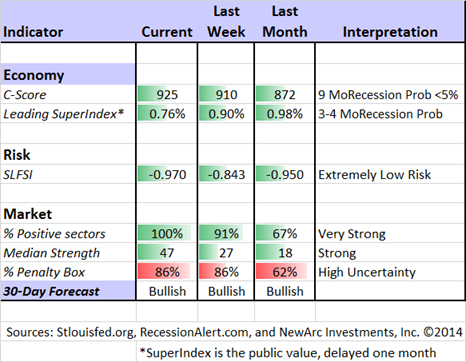The Week Ahead:
Housing data have clearly hit a soft patch. How much of the deceleration is important? How much can be attributed to weather?
Most importantly: Does weakness in housing threaten the economic recovery? What does it mean for stocks?
[Note to readers. I always try for weekend publication, but sometimes I cannot work then. The links and ideas this week were so important and still timely that I decided to finish writing this evening.]
Last Week's Theme Recap
I expected last week's theme to be focused on the market rebound. That was basically correct. I failed to guess that the (delayed) Fed transcripts would finally be released, providing a pundit's dream. It was open season, as everyone went wild using information that they know now to show how stupid the Fed was five years ago.
The weather story continues. We await a "clean" read on data. Until then we are guessing how much is temporary, what sales have been permanently lost, and what has been "pushed forward."
Readers are invited to play along with the "theme forecast." I spend a lot of time on it each week. It helps to prepare your game plan for the week ahead, and it is not as easy as you might think.
This Week's Theme
The market rebound in the face of weak economic data continues to challenge the punditry. The recent improvement in earnings now seems like ancient history, with renewed focus on yet another "soft patch" in economic data. Some will attribute this to the weather, but that explanation (excuse?) can only persist for another month of reports.
Last week's housing weakness is a continuing theme. There are two basic positions, illustrated by objective sources who are open to new information:
- The pessimist is New Deal Democrat. While remaining open-minded about long-term trends, he attributes the weakness to higher interest rates. Read the full piece, but here is a key chart:
The optimist is Calculated Risk. Bill began with an analysis of the housing start data (the sky is not falling) and then a comprehensive update. He does a nice review of the recent spate of weak housing data and the underlying factors. A basic theme is that there is "pent-up demand" in the form of new households. I cannot do justice to the entire article, so you need to read it for yourself. CR writes:
"The bottom line is the housing weakness should be temporary. There should be more inventory this year, price increases should slow, and sales volumes increase."
As always, I have some thoughts that I will share in the conclusion. First, let us do our regular update of the last week's news and data. Readers, especially those new to this series, will benefit from reading the background information.
Last Week's Data
Each week I break down events into good and bad. Often there is "ugly" and on rare occasions something really good. My working definition of "good" has two components:
- The news is market-friendly. Our personal policy preferences are not relevant for this test. And especially -- no politics.
- It is better than expectations.
The Good
There was a little good news.
- The "flash PMI" for the US was very strong. I have not been highlighting these releases, but the pre-market futures seemed to respond. This indicator is going to be like the ADP and the employment report. People will evaluate it based on whether it accurately predicts the official ISM report which comes out a couple of weeks later.
- Weather gains traction as an explanation for economic weakness. This is important because businesses, consumers, and markets will look past something that is viewed as temporary. Please note that I am not offering a conclusion here. I am reporting the facts. Markets, at least for now, are accepting the weather hypothesis. See a good discussion from Matthew Boesler, including this Goldman analysis of the data:
- Earnings remain solid. Beware of "throwing out" specific sectors. (Brian Gilmartin).
The Bad
There was plenty of bad news. Except for housing, it was minor.
- China's flash PMI hit a seven month low. (Reuters).
- Unemployment has moved to the top problem. (Gallup).
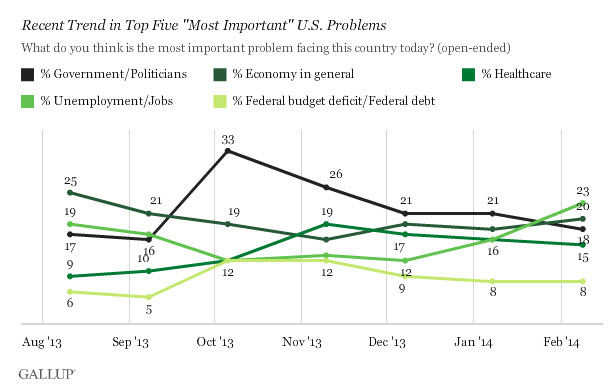
- Philly Fed was weak. I place little emphasis on this. I doubt that most of the pontificating pundits could write three sentences about this report. It is a survey. We do not know the response rate or the margin of error nor whether responses were low last month. It is a diffusion index. It shows a change from the prior month, not an absolute level of performance. If the level is OK, a read of unchanged would be good. Enough!
- Japan was weaker than expected on GDP and exports.
- Housing was bad on all fronts. This is an important theme right now.
- Existing home sales fell over 5%.
- Housing starts plummeted and so did building permits (my personal favorite).
- Homebuilder confidence plunged.
The Ugly
Ukraine. Of course. There is breaking news as I write this. It is an important human story and another chapter in the changing nature of governments around the world. I know that some want to make any conflict into a market story. We can be sympathetic without politicizing our investments. There does seem to be some market reaction to developments, but that should not be our main theme.
The Silver Bullet
I occasionally give the Silver Bullet award to someone who takes up an unpopular or thankless cause, doing the real work to demonstrate the facts. Think of The Lone Ranger. Reader nominations are always appreciated!
Julian Close takes this week's award for an entertaining and persuasive article covering three different sources of misleading information. He takes another shot at the 1929 chart and discusses the "triple top" chart. These simply will not die even when proven wrong. His last effort is a side-splitting analysis of Marc Faber, who always gets plenty of attention. I will not spoil the story. Just read his review of the headlines from Faber's blog and check out the charts.
Quant Corner
Whether a trader or an investor, you need to understand risk. I monitor many quantitative reports and highlight the best methods in this weekly update. For more information on each source, check here.
Recent Expert Commentary on Recession Odds and Market Trends
Georg Vrba: Updates his newest recession indicator, showing an increase in the "weeks to recession" from 26 to 27. This does not mean that there will be a recession in 27 weeks. Instead, it shows that the chance is "statistically remote" that a recession would start during that time. For those interested in gold, Georg also sees a possible buy signal next month. Stay tuned!
RecessionAlert: Sees improvement in leading indicators for US growth, while highlighting danger areas worth monitoring. See the article for detailed charts on each indicator.
Doug Short: An update of the regular ECRI analysis with a good history, commentary, detailed analysis and charts. If you are still listening to the ECRI, you should be reading this update. Doug also has updated the big four indicators important to the NBER in recession dating. Everything except employment is showing a decline – small so far. This is the single best summary of concurrent indicators, so join me in watching it closely.
Matt Busigin has a first-rate analysis of the employment situation, covering many topics with special insight and better use of data. I have followed employment data carefully for many years and I am not easily impressed. This is really good! He covers plenty of news you can use:
- Household versus payroll surveys – the picture is better than we think
- The reality of labor force participation
- We only need job growth of 67K per month to maintain the current unemployment rate
- How much unemployment is structural
- Could the Fed respond to a tight labor market faster? Much faster…
The Week Ahead
This is a very big week for data.
The "A List" includes the following:
- Michigan Sentiment (F). This has extra importance when we are seeking a better read on employment and spending.
- Consumer confidence (T). Same idea as the Michigan survey.
- Initial jobless claims (Th). Continues to be the best concurrent information on jobs.
- New Home Sales (W). Housing remains crucial for the economic recovery.
The "B List" includes:
- Case-Shiller home prices (T). Seems to lag other price indicators, but widely followed.
- Durable goods (Th). January data, relevant to those monitoring GDP.
- Pending home sales (F). All things housing are important.
- Chicago PMI (F). This is always especially important when the calendar delivers it on a Friday and the National ISM comes the next week --- with employment Friday just ahead.
I am not very interested in the GDP revisions. While this provides a base for future measures, it is "old news" for investors. The conclusion of Yellen's "Humphrey-Hawkins" testimony, to use the old name, is now scheduled for Thursday morning. This is probably an all-time record between the House and Senate versions. While the statement will remain the same, we can expect the Senate members to raise some interesting new questions, especially about weather effects and the possible impact on tapering.
How to Use the Weekly Data Updates
In the WTWA series I try to share what I am thinking as I prepare for the coming week. I write each post as if I were speaking directly to one of my clients. Each client is different, so I have five different programs ranging from very conservative bond ladders to very aggressive trading programs. It is not a "one size fits all" approach.
To get the maximum benefit from my updates you need to have a self-assessment of your objectives. Are you most interested in preserving wealth? Or like most of us, do you still need to create wealth? How much risk is right for your temperament and circumstances?
My weekly insights often suggest a different course of action depending upon your objectives and time frames. They also accurately describe what I am doing in the programs I manage.
Insight for Traders
Last week Felix made a dramatic switch from neutral to bullish adding trading positions throughout the week. That has worked pretty well. We remain fully invested and there are many sectors that might emerge from the penalty box. It has been a challenging few weeks for traders. While Felix does not anticipate market tops and bottoms, it was a nice mix of risk and reward.
Insight for Investors
I review the themes here each week and refresh when needed. For investors, as we would expect, the key ideas may stay on the list longer than the updates for traders. The current "actionable investment advice" is summarized here.
This is still an important time for long-term investors. We all know that market corrections of 15% or so occur regularly without any special provocation. Recent years have been the exception. Over the last several weeks I have emphasized the need to maintain perspective, using market declines to add to positions. (It helps if you have been actively rebalancing your portfolio and trimming winners. Then you have some cash). I have also highlighted some of the best advice. Here are highlights from this week:
- Why you should emphasize process rather than outcomes. This is probably the biggest single investor mistake – going for the "hot hand." Barry Ritholtz offers some questions you should ask before evaluating investment returns. He has some interesting football analogies. I strongly agree with the thesis. You need to have a proven process and maintain confidence. Otherwise, you will always sell at the wrong times. It is a foundation of our methods.
- Why liquidity can be your downfall. Warren Buffett explains why you should usually ignore the market noise about your stocks. I agree. I always have target prices for new buys on my watch list and sales of current holdings if there is an attractive offer. It is infrequent trading, but it is not "buy and hold." Here is how Mr. B puts it:
"If a moody fellow with a farm bordering my property yelled out a price every day to me at which he would either buy my farm or sell me his -- and those prices varied widely over short periods of time depending on his mental state -- how in the world could I be other than benefited," Mr. Buffett wrote. "If his daily shout-out was ridiculously low, and I had some spare cash, I would buy his farm. If the number he yelled was absurdly high, I could either sell to him or just go on farming."
That's not how equity holders often react, Mr. Buffett said.
"Owners of stocks, however, too often let the capricious and irrational behavior of their fellow owners cause them to behave irrationally," he wrote. "Because there is so much chatter about markets, the economy, interest rates, price behavior of stocks, etc., some investors believe it is important to listen to pundits -- and, worse yet, important to consider acting upon their comments."
- Beware of the profit margin argument. You know. That claim that the market is about to crash because profits are not "normalized." This is an unending, multi-year theme from those who expect a fast market decline. Each year I try to explain why this reasoning is misguided – based on an overly-simplistic bivariate view of the economy. Each year the people in the comments tell me that I am wrong. Here is my most recent effort. I think that profits will "mean revert" but that many other good things will happen at the same time.
And finally, we have collected some of our recent recommendations in a new investor resource page -- a starting point for the long-term investor. (Comments and suggestions welcome. I am trying to be helpful and I love feedback).
Final Thought
The market has now demonstrated renewed resilience, but no one knows for sure about corrections. For the average investor this is not the right question. It is more important to focus on fundamentals – the economy, earnings, and the risk of recession. These factors are all encouraging.
I have a special respect for Calculated Risk on housing issues. Bill was accurate on the factors in housing and mortgage markets in the pre-crash era. He has earned a widespread respect among professional economists as he has broadened his commentary and analysis.
I suspect that some of his early followers have moved on as his commentary as become (quite accurately) more bullish. This is especially unpopular right now – both politically and in the popular market media. It is not the path to page views.
Since housing is very important for the economy, I am watching closely. Most casual observers focus on foreclosures and "shadow supply" which ignoring the "shadow demand." These kids cannot live in the basement forever!

